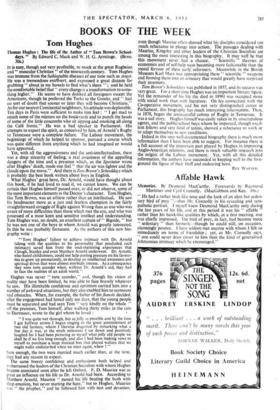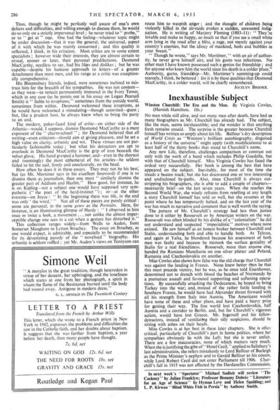Affable Hawk
Memories. By Desmond MacCarthy. Forewords by Raymond Mortimer and Cyril Connolly. (MacGibbon and Kee. 16s.) " Hs had a rather beak-like nose and the look of an alert but seden- tary bird of prey "—thus Mr. Connolly in his revealing and sym- pathetic portrait. I myself knew Desmond MacCarthy only during the last years of his life, and at this period it was his " affable " rather than his hawk-like qualities by which, at a first meeting, one was chiefly impressed. The bird of prey, in fact, had become more " sedentary, " than formerly—though he could still, on occasion, alarmingly pounce. I have seldom met anyone with whom 1 felt so immediately on terms of friendship ; yet, as Mr. Connolly says, " one could never draw closer to him than the kind of generalised Johnsonian intimacy which he encouraged." Thus, though he might be perfectly, well aware of one's own defects and difficulties, and willing enough to discuss them, he would do so only on a strictly impersonal level ; he never tried to " probe," or to " get at " one. One had the feeling—whatever topic might be under discussion—that it was the general, the universal, aspect of it with which he was mainly concerned ; and this quality is reflected, I think, in his criticism. Most critics are to some extent specialists ; however wide their interests, they are almost certain to reveal, sooner or later, their personal predilections. Desmond MacCarthy, needless to say, had his likes and dislikes ; but he was capable—despite his humane approach to letters—of a greater detachment than most men, and his range as a critic was exception- ally comprehensive.
His Bloomsbury friends, indeed, were sometimes inclined to mis- trust him for the breadth of his sympathies. He was not content— as they were—to remain permanently immured in the Ivory Tower, which in any case (as he points out in his essay on Logan Pearsall Smith) is " liable to irruptions," sometimes from the outside world, sometimes from within. Desmond welcomed these irruptions, as he would have welcomed a stimulating—though uninvited—guest ; but, like a prudent host, he always kitew when to bring the party to an end.
The modern, poker-faced kind of critic—on either side of the Atlantic—would, I suppose, dismiss Desmond MacCarthy as a. mere exponent of the " charm-school " ; for Desmond believed that all writing—even criticism—should aim at giving pleasure, and he set a high value on clarity, urbanity and wit. These virtues are not par- ticularly fashionable today ; but what his detractors are apt to overlook in Desmond MacCarthy is the grip of iron beneath the velvet glove. His hand grasped a hammer, and—even-in the shortest and (seemingly) the most ephemeral of his articles—he seldom failed to hit the nail, firmly and conclusively, on the head.
How often he does it in these essays. They may not be his best, but (as Mr. Mortimer says in his excellent foreword) if one is to dismiss them as journalism, then one must " similarly dismiss the greater part of Addison and Hazlitt." How good, for instance, he is on Kipling—not a subject one would have supposed very sym- pathetic (" the poet of the herd-instinct ") ; or—at the other extreme—on Joyce : " In the beginning there was life, in the end was only ' the word.' " Not all of these pieces are purely critical : some are personal, in the same genre as the Portraits. Here, for instance, is an illuminating glimpse of Hardy : " I observed in him once or twice a look, a movement ... not unlike the almost imper- ceptible change one sees in a cat when a gesture has disturbed it." This collection ranges widely—from Wells to Auden, from Somerset Maugham to Lytton Strachey. The essay on Strachey, as one would expect, is admirable, and especially to be recommended for its devastating parody of the " novelised " biography. His urbanity is seldom ruffled ; yet Mr. Auden's views on Tennyson can rouse him to waspish anger ; and the thought of children -being violently killed in the air-raids evokes a sudden, unwonted indig- nation. He is writing of Marjory Fleming (1803-11) : " They're laable and make us happy, .so much so that if you see a small white arm lying in the road after a blitz, a rage, not merely against your country's enemies, but the idiocy of mankind, boils and bubbles in your breast."
" Though he wrote," says Mr. Mortimer, " with an air of author- ity, he never gave himself airs, and his gusto was infectious. No other man-I have known possessed such a genius for friendship ; and for anyone who knew him the world since his death is a colder place." Authority, gusto, friendihip—Mr. Mortimer's summing-up could scarcely, I think, be bettered : for it is by these qualities that Desmond MacCarthy, in a colder world, will be chiefly remembered.
JOCELYN BROOKE.



































 Previous page
Previous page